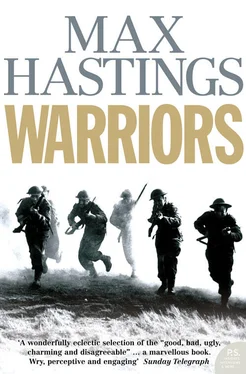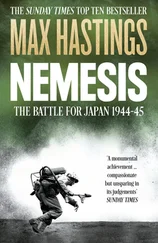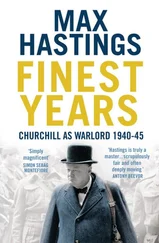The warrior deserving of the highest praise is he who demonstrates fortitude alone, without the stimulus of comradeship. C.S. Forester wrote a wry little novel entitled Brown on Resolution (1929). It tells the story of a British sailor in the First World War, sole unwounded survivor of a cruiser sunk in the Pacific by a German raider. Brown escapes from captivity with a rifle onto an uninhabited volcanic island, Resolution, where the German ship has put in for repairs. This stolid young man, schooled all his life to a simple concept of duty, knows that the consequence of his actions must be death, but accepts his fate unquestioningly. By harassing the warship from the shore, the lone sailor delays its departure just long enough for a British squadron to engage and sink it with all hands. Brown himself is left mortally wounded, dying alone on his barren rock. For our purposes the key element in Forester’s story is that no one afterwards knows what Brown did, or what his lonely sacrifice achieved. This is a cautionary tale for warriors. The highest form of courage is that of a man who surrenders his life for others without hope of recognition. There have been innumerable such instances throughout history, which by their nature are unknown to us.
By contrast many acts of heroism, some recorded in this book, have been committed in the active hope of advancement or glory. Eager warriors, aspiring heroes, ‘gong chasers’, are generally disliked and mistrusted by those of more commonplace disposition who are obliged to serve with them. Many soldiers display a baleful attitude towards officers who are perceived to be excessively aggressive. ‘It’s all right for him if he wants to win a VC or a Congressional Medal,’ they mutter, ‘but what about us ?’ The leaders most readily admired are those who seem committed to do their duty, and also to bring every possible man home alive. The rank and file recoil from officers who seem indifferent to the ‘butcher’s bill’ for their actions. The British colonel most respected by his men in the Falklands campaign, for instance, was by no means the most celebrated. Instead, he was an officer who gained his combat objectives by meticulous planning and diversionary fire, followed up by a dashing flank assault, which achieved success with minimal casualties.
Many celebrated warriors are detested by their comrades. I grew up to idolise Wing-Commander Guy Gibson, who led the 1943 RAF dam-breaking raid on the Ruhr. When researching the bomber offensive for a book, it was a shock for me to discover how much Gibson was disliked by some of those who served under him. ‘He was the sort of little bugger who was always jumping out from behind a hut and telling you your buttons were undone,’ said a gunner in 1978, his resentment undimmed by the passage of thirty-five years. The courage of Lieutenant-Colonel Herbert Jones, commanding 2 Para at Goose Green in the Falklands in May 1982, undoubtedly merited the posthumous Victoria Cross which he received. But more than a few of his comrades in the British army argued that his action in charging personally at the Argentine positions was the negation of the role of a battalion commander, and reflected the fact that he had lost control of the battle. ‘H’ Jones was a fiercely emotional man, fired by a heroic vision which he yearned to fulfil. Many soldiers prefer to be led against the enemy by cooler and more cautious spirits.
A cynic might suggest that some eager warriors are exhibitionists of an extreme kind. A cynic would be right. This does not diminish warriors’ claims upon our regard, but may make us a trifle more sceptical about their motives. Adventure has always been a selfish business,’ author and traveller Peter Fleming once observed. ‘The desire to benefit the community is never [adventurers’] principal motive…They do it because they want to. It suits them; it is their cup of tea.’ The same can be said of eager warriors. A relative of an officer who was responsible for an exceptionally brave action in North Africa in the Second World War once related a story which the family hero possessed enough self-knowledge to tell against himself. Soon after the North African battle took place, the young man went to his colonel and complained that while several fellow officers had received Military Crosses, he himself had got nothing. He felt hard done by. The colonel did not reveal to his young lieutenant that he had been recommended for a Victoria Cross, which was gazetted shortly afterwards. This anecdote emphasises the fact that some men commit brave acts not spontaneously, but in conscious pursuit of recognition.
All armies seek to create an ethos in which such ambitions prosper. Only where at least a handful of soldiers possess either an exceptional sense of duty – like Sergeant-Major Hollis – or an extravagant hunger for fame – like the VC winner mentioned above – can the cause of their nation in arms flourish. A small minority of natural warriors is almost invariably fighting alongside a majority of other soldiers who threaten their army’s prospects of operational success by their eagerness to preserve their own lives. Macaulay’s Horatius demanded:
How can man die better than facing fearful odds,
For the ashes of his fathers and the temples of his gods?
From a Western commander’s viewpoint, however, a distressingly small number of men share this sanguine view. There is an element of hypocrisy about the manner in which democracies deplore ‘fanatical’ or ‘suicidal’ behaviour in battle by foes such as the wartime Japanese and Germans, and even the modern terrorist. Western armies have awarded their highest decorations, often posthumously, in recognition of behaviour in action which was more likely than not to result in the death of the warrior concerned. It is because it is so difficult to persuade sensible Western soldiers to perform acts likely to cause their own deaths that democratic societies become alarmed when they perceive hostile races capable of more aggressive behaviour than their own. This observation is not intended to applaud fanaticism, merely to recognise our double standard. A modern Islamic suicide bomber might assert that his actions would have won warm Western applause if performed sixty years ago against the Nazi oppressors of Europe. A host of Allied medal citations in two world wars included the approving words: ‘with absolute disregard for his own safety’.
The currency in which a notable warrior has been rewarded in modern times is, of course, an intrinsically worthless disc or cross of metal, which society has successfully promoted as desirable. The United States and Britain have customarily awarded the Congressional Medal of Honor and the Victoria Cross – both mid-nineteenth-century creations – for single acts of bravery, episodes which lasted only a matter of minutes. Remarkably few of these supreme national tokens have been given for displays of courage sustained over months or years, such as were demanded as a commonplace from soldiers of earlier centuries. Indeed, the first VC was awarded for an act many people would consider a mere impulsive gesture of self-preservation: during the Crimean War a British sailor picked up a live shell which landed on the deck of his ship, and threw it overboard. In a rash moment, Congress once awarded its Medal of Honor to every member of a Civil War regiment, until wiser counsels prevailed and this largesse was retracted.
A friend who served as an infantry officer in Italy in the Second World War once observed to me that when one is twenty years old, the prospect of a ‘gong’ can incite some men to remarkable exertions. The possibility of recognition through medals has prompted many warriors to try harder, and thus caused battles to be won. The warrior’s cliché is correct, that ‘the only one who knows what a medal is worth is the man who won it’. All veterans perceive a distinction between a ‘good’ Silver Star or DSO or Croix de Guerre – gained for courage and leadership – and the other kind which ‘comes up with the rations’, not infrequently as a gesture to a career officer with influential connections. The courage of General George Patton was undisputed, but posterity is entitled to recoil from the shamelessness with which in both world wars he solicited medals from friends in high places – and received them. Likewise, I recall the rancour of an RAF veteran as he described his 1943 squadron commander. Many aircrew considered this officer a coward. He relaxed sufficiently one night in the mess to avow without embarrassment: ‘I am a career airman. I intend to survive the war.’ So he did, taking considerable care of his own safety. But the fellowship of the RAF hierarchy ensured that he got his ‘gong’ when he relinquished his squadron. Few people whom the wing-commander met in later life can have possessed any notion how relatively easily his DSO was earned. In the eyes of a new generation ignorant of the nuances of the warrior culture, the mere fact of an officer’s operational service admitted him to the ranks of ‘war heroes’.
Читать дальше












